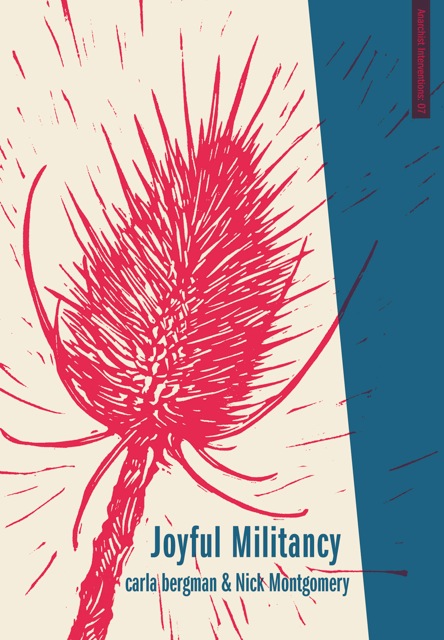For this interview we (carla and Nick) sent Marina Sitrin a ‘preamble’ outlining some of the ideas behind our book Joyful Militancy (available here!), and then included a couple questions based on Sitrin’s other writings (especially Horizontalidad: Voces de Poder Popular en Argentina). We do not include the preamble here because as time went on in the researching, interviewing and writing of the book our ideas and articulations shifted. For that, we are deeply indebted to all our interviewees who offered new insights and shed light on areas that needed reworking. Instead we have added a short overview about the book, below, so the interview can stand alone. Our website also includes the book’s introduction and other excerpts.
Joyful Militancy Overview
Why do radical movements and spaces sometimes feel laden with fear, anxiety, suspicion, self-righteousness and competition? In Joyful Militancy, we call this phenomenon rigid radicalism: congealed and toxic ways of relating that have seeped into radical movements, posing as the “correct” way of being radical. In conversation with organizers and intellectuals from a wide variety of currents, we explore how rigid radicalism smuggles itself into radical spaces, and how it is being undone. Rather than proposing ready-made solutions, we amplify the questions that are already being asked among movements. Fusing together movement-based perspectives and contemporary affect theory, Joyful Militancy traces emergent forms of trust, care and responsibility in a wide variety of radical currents today, including indigenous resurgence, anarchism, transformative justice, and youth liberation. Joyful Militancy, by carla bergman and Nick Montgomery, foregrounds forms of life in the cracks of Empire, revealing the ways that fierceness, tenderness, curiosity, and commitment can be intertwined.
#joyfulmilitancy
Joyful Militancy, by Nick Montgomery and carla bergman – a new book coming soon from the Institute for Anarchist Studies and AK Press!

Why do radical movements and spaces sometimes feel laden with fear, anxiety, suspicion, self-righteousness and competition? The authors call this phenomenon rigid radicalism: congealed and toxic ways of relating that have seeped into radical movements, posing as the ‘correct’ way of being radical. In conversation with organizers and intellectuals from a wide variety of currents, the authors explore how rigid radicalism smuggles itself into radical spaces, and how it is being undone. Rather than proposing ready-made solutions, the authors amplify the questions that are already being asked among movements. Fusing together movement-based perspectives and contemporary affect theory, they trace emergent forms of trust, care and responsibility in a wide variety of radical currents today, including indigenous resurgence, anarchism, transformative justice, and youth liberation. Joyful Militancy foregrounds forms of life in the cracks of Empire, revealing the ways that fierceness, tenderness, curiosity, and commitment can be intertwined.
One of our basic premises is that transformative potentials are always already present and emergent. Not only can things be otherwise; they already are, and it is a matter of tuning, tending, activating, connecting, and defending these processes of change that are already in the making. People are always enacting alternatives to the dominant order of things, however small, and there are always new connections and potentials to explore. We see this kind of sensibility happening in currents of feminism, queer theory, Black liberation, Indigenous resurgence, youth liberation, anarchism, autonomism, and radical ecology, among others, and we seek to affirm these movements and practices throughout the book.
“This wonderful book, infused and informed by activist experience, emphasizes the importance of the full range of political affects. Anger and rage rightly, inevitably drive militants, the authors argue, but we must also discover joy and friendship in struggle, which are our highest rewards. The book provides not only an antidote for anyone who has suffered the pitfalls of political activism but also a guide to a fulfilling militant life.”
—Michael Hardt, co-author of Empire, and Assembly
Joyful Militancy features a foreword by Hari Alluri and interviews with Silvia Federici, adrienne maree brown, Marina Sitrin, Gustavo Esteva, Walidah Imarisha, Glen Coulthard, Richard Day, and others. It is the seventh title in the IAS’s Anarchist Interventions book series. Art by Pete Railand and cover and design by Josh MacPhee of Justseeds Artists’ Cooperative
